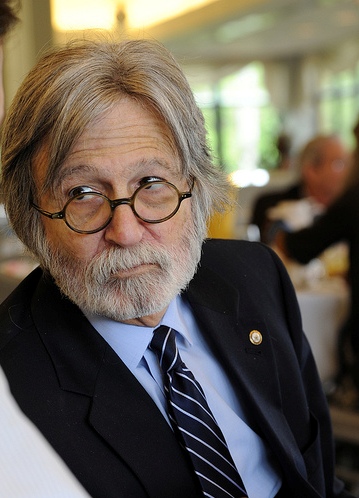As every mega multi-tasker knows, a bit of daily down-time is an absolute necessity. For the most part, my down-time occurs in one of two places: 24-hour Fitness, where I get in a rigorous 2-hour workout a couple of times a week and the local dog park where our hunte, Fred Astaire Stone, is a local celebrity. Being that "Mr. Austerlich" (Astaire's real name) is mostly greyhound (only God knows what the rest is), he is highly supple, and runs like an effortless gale. Whenever Fred puts it in high gear leaving the rest of the pack in the dust, I am reminded of the old Johnny Tillotson song "Poetry in Motion" -- " . . . a wave out on the ocean could never move that way . . .
Fred is on speaking terms with just about every dog in the park. His "father" (moi), on the other hand, knows the canines better than their owners -- i.e. the fellow with the stinky cigar is "Maxie's Dad," the gal with the curly red hair "Sandy's Mom," etc. I don't engage in too many conversations at the dog park. It's not that I'm a snob or standoffish; far from it. Rather, it's my time spend a hour or so unwinding, becoming reasonably invisible reading (at the moment I'm plowing through Dreiser's The Genius), observing, and above all, listening. One thing I've observed is how much people have in common with their dogs -- both physically and emotionally. Overweight people tend to have overweight dogs; obstreperous folks tend to have yapping hounds; young marrieds frequently have puppies, etc.
One rule I've tried to set for myself -- at both the gym and the park -- is not to become involved in political discussions. Goodness knows, between delivering university lectures and campaign speeches, and writing weekly essays, articles and op-ed pieces, I spend enough waking hours dealing with the subject; my time at the gym or park is supposed to be somewhat of a busman's holiday. I say supposed to be, because it doesn't always work out that way. Especially as election day gets closer and closer. Occasionally, people at the park -- knowing who I am and what I do for a living -- will ask me things like "Who do you think won the debate last night?" or "Do you think Obamacare is Socialist?" or "How can you support Obama considering how much he hates Israel?" Generally, instead of answering the question, I will put down my book or Kindle, and ask the questioner, "Who do you think won the debate?" or "Do you think Obamacare is Socialist," or "What makes you think that the president hates Israel? At this point, one of two things will generally happen: either, the conversation fizzles out, or the person will respond with something that sounds like a canned talking point from campaign ads or TV/radio talking heads. (To be certain, this is true for both Republicans and Democrats.) It makes me wonder how many people actually think for themselves anymore. Lest anyone think that this last sentence betrays a haughtiness or sense of superiority on my part, let me assure one and all that it is not -- repeat -- not in my nature to be an intellectual snob.
Rather, I'm just calling 'em as I see 'em.
As I mentioned above, one of the things I do engage in while at the park is listening -- playing the role of "fly on the wall." And of course, much of what I'm listening in on are conversations about current events: the presidential election, Romney and Ryan, Obama and Biden, the economy, the Middle East . . . you name it. Frequently, I hear people making seemingly authoritative statements based on little more than what they've heard others say. Often, they employ expressions that are likely not their own. As an example, a group sitting together will all agree that President Obama has "thrown Israel under the bus" -- a verbatim quote taken from Romney himself. Or "Biden's a clown," or "The president hates big business," or "Obama wants to turn the United States into a Socialist country." If someone will challenge the statement or ask "And how the President thrown Israel under the bus?" or "What has he done to show that he hates big business?" the answer will invariably involve boilerplate rhetoric.
On the other side of the same coin, I hear people flatly stating things like "Romney will create millions of jobs -- he's a businessman with a long track record of doing just that," or "Romney will be much tougher on Iran than Obama," or "Under Romney, the Syrians had better watch out!" But again, when challenged, they really don't know how to back up these statements with facts . . . for in many cases, there are no facts.
No one likes to come off seeming or sounding like they don't know what they're talking about -- especially when it comes to politics and world affairs. And yet, so much of what passes for "knowledge" these days is based on what paid partisans broadcast over cable or on the internet. Take the presidential and vice presidential debates. Eight or ten hours before the evening's debate begins, everyone from Rush Limbaugh, Gretchen Carlson and Bill O'Reilly to Ed Schultz, Alex Wagner and the Reverend Al Sharpton begin telling their listeners or viewers what to expect. And then, once the debate has concluded, they -- along with their like-minded colleagues -- will spend the next 36 hours telling their listeners or viewers who won and why, what they saw and heard, and how it all bodes for the future. And of course within hours of a debate's conclusion, both campaigns -- along with their anonymous financial surrogates -- are airing interminable commercials showing that their candidate was the obvious victor, the other guy an out-and-out liar.
This election is simply too important, too critical for others to tell us what to think.
What do you think?






